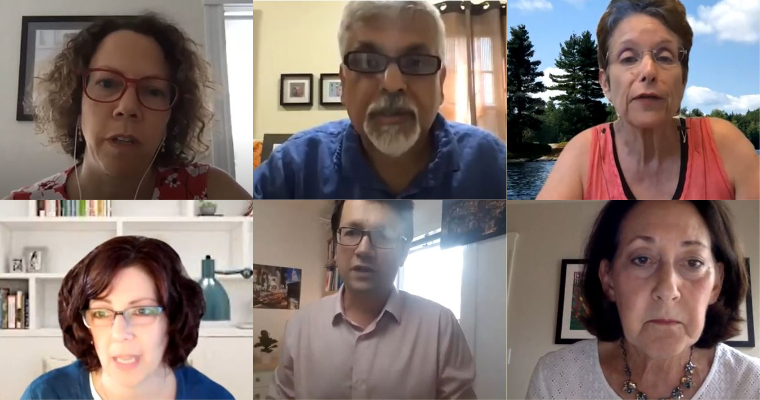Virtual Information Sessions Prepare UMass Boston Faculty for Remote Semester
A series of virtual information sessions are equipping UMass Boston faculty with the tools and resources necessary to engage with students during the remote fall 2020 semester. The live webinar sessions, called Teach Fall 2020, offer faculty the opportunity to hear from colleagues regarding best practices for remote learning and student engagement.

Since its launch earlier this summer, Teach Fall 2020 has brought together faculty members from all departments to discuss various strategies to promote engagement with students in a remote modality. Associate CIO Apurva Mehta said that each session brings between 125 and 140 faculty members.
“We were truly surprised by the turnout. This gave us the momentum to continue. We ask the faculty on the topic they would like to learn more about and try and host a live event on that topic. More importantly we get faculty to present, which I think adds a lot of value,” said Mehta, who hosts the sessions with Judy Goleman, director of the Office for Faculty Development; Carol Sharicz, director of Center for Innovative Teaching; and Mya Mangawang, vice provost for Strategic Initiatives.
Sessions have also explored methods to remotely support students’ overall well-being, especially in light of recent events.
“So much has transpired since February that has impacted our students. The goal of this event [was] to share with our faculty members the impact COVID-19 and the Black Lives Matter movement has had and how faculty might recognize and assist our students in the coming fall semester,” said Mehta.
Most recently, Teach Fall 2020 introduced a two-part session earlier this month. The first session, entitled “Synchronous and Asynchronous Approaches for Active Remote Learning,” explored different learning modalities and how to address the unique instructional challenges that arise from remote learning.
“This is a topic that received many questions from faculty, so we decided to build a program around it where faculty can learn from others some of the modalities for teaching for the fall semester,” said Mehta.
Four faculty members presented during the 90-minute session: Amy Cook, Associate Professor, Department Chair and Graduate Program Director of Counseling in the College of Education and Human Development (CEHD); Andrew Perumal, Associate Professor, Department of Economics in the College of Liberal Arts; Denise Patmon, Associate Professor of Education, Department of Curriculum and Instruction in CEHD; and Werner Kunz, Associate Professor of Marketing in the College of Management.
“What I do is set expectations for a shared learning and safe environment,” said Cook, whose presentation addressed student-centered and trauma-focused teaching as a foundation of online learning. “That’s the foundation of how I approach my teaching; it’s really a shared experience.”
Perumal, who has taught an asynchronous summer course called Introduction to Macroeconomics over the past four years, used his experience to provide faculty with tips to engage with students during the remote fall 2020 semester.
“What I’ve been playing around with quite a bit in the last few weeks is really thinking about how I can translate some of the lessons I’ve learned … and how some of those tricks that I’ve gathered can then translate into giving us a way to think about blending asynchronous and synchronous for the fall,” said Perumal, calling it a “work in progress.”
The presentations were followed by a Q&A session in which faculty were invited to ask the four faculty panelists for advice and suggestions regarding their own experiences with remote teaching/learning. The ongoing theme of the questions revolved around fostering a connection with students, especially in larger virtual classrooms where the opportunity may not present itself as often.
The second part of the session, called “Hands-on Workshop on Synch and Asynch Application to Your Own Course Module,” encouraged faculty members to share learning goals and discuss effective learning strategies to achieve those goals. The interactive session was spearheaded by Carol Sharicz and e-learning support facilitators, who provided feedback throughout the discussion.
Upcoming sessions for Teach Fall 2020 will explore strategic implementation of Blackboard, Learning Original, VoiceThread, Zoom, EdTech, and Echo. More information about these sessions, as well as recordings of past sessions, can be found on UMass Boston’s eLearning and Instructional Design’s page.
About UMass Boston
The University of Massachusetts Boston is deeply rooted in the city's history, yet poised to address the challenges of the future. Recognized for innovative research, metropolitan Boston’s public university offers its diverse student population both an intimate learning environment and the rich experience of a great American city. UMass Boston’s colleges and graduate schools serve 16,000 students while engaging local and global constituents through academic programs, research centers, and public service. To learn more, visit www.umb.edu.
